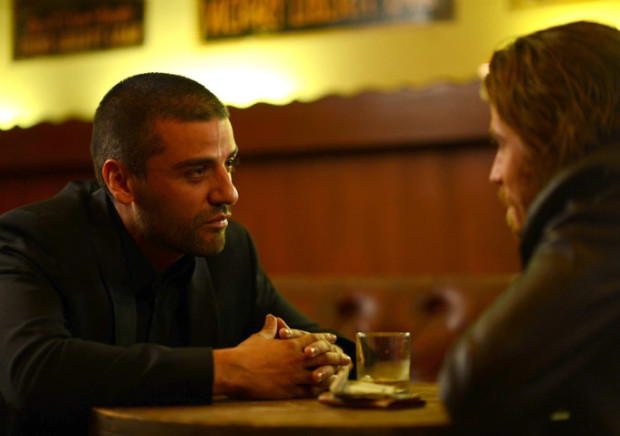Genre: Drama/Mystery
Premise: After a home invasion ends in the accidental murder of a mother, her young son is convinced that he knows who the killers are. Unfortunately, nobody believes him.
About: This is a script that the Coen Brothers wrote back in 2007, but it never made it into their production pile. Enter George Clooney, who ADORES the Coens. If they’ve got an available script floating around, you can bet your ass he’s going to read it. And apparently, he liked what he saw. Also, cause he’s George Clooney, he can get a killer cast. Suburbicon will star Oscar Isaac, Matt Damon, Julianne Moore, Josh Brolin, and Woody Harrelson.
Writers: Ethan and Joel Coen
Details: 113 page – March 27, 2007 draft
As some of you know, I have a love-hate relationship with the Coen Brothers. At times I believe they understand screenwriting better than any writers in Hollywood. They’re great at stripping plots down (usually focusing on a bag of money), populating their stories with unforgettable characters, and making unique choices.
But then they make movies like Inside Llewyn Davis, which seemed to breed boringness, or Hail, Caeser, which seemed so desperate to make up for that boringness, that it became boring in its anti-boringness. In many ways, the Coens are a victim of their unique voice. By the very nature of being so different, audiences aren’t always going to come along for the ride with you.
This time, the Coens are handing over directing duties to their star pupil, George Clooney. Clooney, who’s directed four movies so far, seems to want to take the Clint Eastwood approach to his career. He’s repeatedly said he’s uncomfortable with getting old onscreen, so I imagine we’ll soon see him exclusively behind the camera. Let’s check out what he’s working with this time around.
8 year-old Nicky Lodge hears his dad outside his bedroom door talking to an unfamiliar voice. When his father, Gardner, opens the door, he tells Nicky that a couple of men are here, and as long as we do what they say, they’ll leave us alone and everything will be all right.
So Nicky, Gardner, Gardner’s wheelchair-bound wife, Rose, and Rose’s sister (Nicky’s aunt), Margaret, are taken to the basement, tied up, and given chloroform. When Nicky wakes up, he’s at the hospital learning that his mother is dead.
Later, when Nicky, Gardener, and Margaret are brought in to a police line-up to identify the potential killers, Gardener strangely asks that Nicky leave the room. But Nicky is able to see the line-up through an ajar door. He also sees his father and aunt look directly at the men who killed his mother and tell the police that that’s not them.
That’s the first moment Nicky realizes something is wrong.
When he confronts his dad about the ordeal, his dad tells him that Nicky is simply misremembering. But the next day, when Nicky gets home from school early and sees his father and Margaret naked on the pool table, he knows something is seriously up.
Sensing that his son is onto them, Gardner enrolls him in boarding school, but before he can even begin to put that together, a suspicious insurance auditor comes around wanting some questions answered about Rose’s suspicious insurance policy. Oh, and let’s not forget the two guys who perpetrated the murder, who are tired of waiting for their payoff. Yeah, they show up as well.
It looks like whatever plan these two thought they’d pull off isn’t going to end the way they thought it would.
Every serious screenwriter needs to read the first scene of this script. It does five deadly important things right:
Starts the script off with a bang to grab the reader’s attention.
Approaches the scene in a unique way.
It’s intensely suspenseful.
It builds.
It holds tension throughout.
I’m lucky if I read a script where a writer is able to do one of these things right in an entire screenplay. To do all five in one scene shows why the Coens are two of the only people to win multiple screenwriting Oscars.
So let’s go into all of these in detail.
The first one’s obvious. I tell you guys to pull your reader in right away with your opening scene. Here, we open with a murder. Perfect.
The second is what sets the Coens apart from their competition. They’re really good at coming into scenes from a UNIQUE POINT-OF-VIEW. This gives what would otherwise be a been-there-done-that scenario a fresh angle. So instead of seeing the murder from the dad’s or the killers point-of-view, we see it from this kid’s point of view. And since Nicky isn’t sure what’s happening exactly, everything feels fresh and different.
Third is suspense. Remember, the best kind of suspense is to imply that something bad is going to happen, and then you draw it out for as long as you can. We know early that these men are up to no good. So everything that happens before the chloroform plays like gangbusters.
Fourth, the scene builds. A lot of writers want to jump into the climax right away. For example, we’d show the killers screaming and yelling and then gunshots would go off. That’s a really boring way to show a murder. Instead, we start off with Nicky being brought out of his bedroom, then downstairs. We then have a conversation in the living room. We then find out that we’re going downstairs. We then find out that we’re going to be tied up. We then find out that, person by person, we’re going to be given chloroform. Each “stage” or “level” is worse than the last. That’s how you build in a scene.
Finally, we have tension. I feel that too many writers go for instant gratification in a scene. They want to “burst the balloon” so-to-speak. Instead, pretend that your fingers are the only thing keeping the air in the balloon. Hold onto that opening AS TIGHT AS YOU CAN. Keep that tension throughout
Honestly, this first scene should be taught in film school.
And really, the majority of this script could be taught in film school. For example, what do I always say about funerals? DON’T PLAY THE OBVIOUS EMOTION in THE SCENE. Play any emotion BUT the expected one. So after the mother’s funeral, we don’t have Nicky telling his dad how much he misses mom, or a scene where the dad breaks down crying in the middle of the wake. We have Nicky walking with his weird uncle, who’s bitching about how lame the service was. The emotion he plays is ANGER, which works against the expected tone, and therefore makes for a good scene.
And the Coens can always find ways to add tension to scenes so that even the smallest ones have something going on in them. Because remember, the most boring scene you can write is two people sitting or standing across from each other in a generic location talking about whatever needs to be talked about in that scene.
Here, our two killers, Luis and Ira, are bus drivers. Luis, who’s working today, is avoiding Ira because Ira wants to put more pressure on Gardner to get their money sooner. So when Ira shows up on Luis’s route, he demands that Luis step outside for a talk. Luis reluctantly comes outside, and Ira tells him what he needs to tell him.
The scene works better because now you have 20 bus passengers popping out and saying, “Why the fuck are we stopped?” “This isn’t even a real stop.” This turns what could’ve been a boring scene (two people sitting or standing across from each other in a generic location) into an intense one. This is the kind of writing, guys, that top producers notice. They know that writers who know how to do this shit are good writers.
My only issue with Suburbicon was the ending. It came together too quickly. There’s a classic Coen Brothers scene where the insurance agent shows up and tells Gardner he’s onto him where I thought, “Ooh, this is about to get good,” then everything goes to shit quickly and before I knew it, I was at the end. It just felt like we needed more time to get there.
Still, this script shows why these guys are heads and tails above all the other screenwriters out there. Definitely check it out if you can.
[ ] What the hell did I just read?
[ ] wasn’t for me
[ ] worth the read
[x] impressive
[ ] genius
What I learned: The more helpless you can make your main character, the more compelling the drama will be. The reason this script is so intense is because our hero is 8 years old and powerless. Even though he knows who killed his mom, he can’t do anything about it, and that’s why we turn the pages. We’re hoping against all hope that he somehow finds a way. To understand why this works so well, switch 8 year-old Nicky out and replace him with a 30 year-old man. A 30 year old man would be able to solve this problem immediately. We’d feel very comfortable with him taking care of the problem. As you should know, “comfortable” in storytelling is the same thing as “boring.” One of the many reasons the Coens can rock the page.
What I learned 2: If something is obvious, you don’t need your character to say it. So let’s say a woman’s husband dies. You don’t then have the woman say, “I can’t believe he’s no longer here. I miss him so much.” Oh really? Wow, I never would’ve guessed that. If it’s obvious, the audience knows. You don’t need to have your character say it so that they get it. This is VERY common beginner screenwriter tell.



